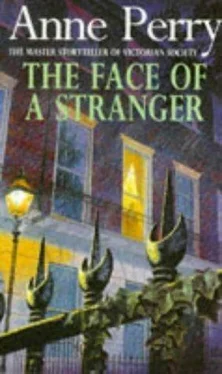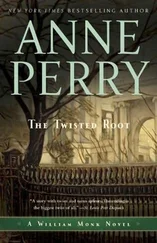Anne Perry - The Face of a Stranger
Здесь есть возможность читать онлайн «Anne Perry - The Face of a Stranger» весь текст электронной книги совершенно бесплатно (целиком полную версию без сокращений). В некоторых случаях можно слушать аудио, скачать через торрент в формате fb2 и присутствует краткое содержание. Жанр: Исторический детектив, на английском языке. Описание произведения, (предисловие) а так же отзывы посетителей доступны на портале библиотеки ЛибКат.
- Название:The Face of a Stranger
- Автор:
- Жанр:
- Год:неизвестен
- ISBN:нет данных
- Рейтинг книги:4 / 5. Голосов: 1
-
Избранное:Добавить в избранное
- Отзывы:
-
Ваша оценка:
- 80
- 1
- 2
- 3
- 4
- 5
The Face of a Stranger: краткое содержание, описание и аннотация
Предлагаем к чтению аннотацию, описание, краткое содержание или предисловие (зависит от того, что написал сам автор книги «The Face of a Stranger»). Если вы не нашли необходимую информацию о книге — напишите в комментариях, мы постараемся отыскать её.
The Face of a Stranger — читать онлайн бесплатно полную книгу (весь текст) целиком
Ниже представлен текст книги, разбитый по страницам. Система сохранения места последней прочитанной страницы, позволяет с удобством читать онлайн бесплатно книгу «The Face of a Stranger», без необходимости каждый раз заново искать на чём Вы остановились. Поставьте закладку, и сможете в любой момент перейти на страницу, на которой закончили чтение.
Интервал:
Закладка:
"I understand Menard Grey was also a close friend of your son's," Monk said, as much to fill the silence as that it might have mattered.
Dawlish stared at the coals. "Prefer not to speak of it," he replied with difficulty, his voice husky. "Thought a lot of him-but he led Edward into bad ways-no doubt about it. It was Joscelin who paid his debts-so he did not die with dishonor."
He swallowed convulsively. "We became fond of Joscelin, even on the few weekends he stayed with us." He lifted the poker out of its rest and jabbed at the fire fiercely. "I hope to heaven you catch the madman who did it."
"We'll do everything we can, sir." Monk wanted to say all sorts of other things to express the pity he felt for so much loss. Thousands of men and horses had died, frozen, starved, or been massacred or wasted by disease on the bitter hillsides of a country they neither knew nor loved. If he had ever known the purpose of the war in the Crimea he had forgotten it now. It could hardly have been a war of defense. Crimea was a thousand miles from England. Presumably from the newspapers it was something to do with the political ramifications of Turkey and its disintegrating empire. It hardly seemed a reason for the wretched, pitiful deaths of so many, and the grief they left behind.
Dawlish was staring at him, waiting for him to say something, expecting a platitude.
"I am sorry your son had to die in such a way." Monk held out his hand automatically. "And so young. But at least Joscelin Grey was able to assure you it was with courage and dignity, and that his suffering was brief."
Dawlish took his hand before he had time to think.
"Thank you." There was a faint flush on his skin and he was obviously moved. He did not even realize until after Monk had gone that he had shaken hands with a policeman as frankly as if he had been a gentleman.
That evening Monk found himself for the first time caring about Grey personally. He sat in his own quiet room with nothing but the faint noises from the street in the distance below. In the small kindnesses to the Dawlishes, in paying a dead man's debts, Grey had developed a solidity for more than in the grief of his mother or the pleasant but rather insubstantial memories of his neighbors. He had become a man with a past of something more than a resentment that his talent was wasted while the lesser gifts of his elder brother were overrewarded, more than the rejected suitor of a weak young woman who preferred the ease of doing as she was told and the comfort of status to the relative struggle of following her own desires. Or perhaps she had not really wanted anything enough to fight for it?
Shelburne was comfortable, physically everything was provided; one did not have to work, morally there were no decisions-if something was unpleasant one did not have to look at it. If there were beggars in the street, mutilated or diseased, one could pass to the other side. There was the government to make the social decisions, and the church to make the moral ones.
Of course society demanded a certain, very rigid code of conduct, of taste, and a very small circle of friends and suitable ways to pass one's time, but for those who had been brought up from childhood to observe it, it was little extra effort.
Small wonder if Joscelin Grey was angry with it, even contemptuous after he had seen the frozen bodies on the heights before Sebastopol, the carnage at Balaclava, the filth, the disease and the agony of Scutari.
In the street below a carriage clattered by and someone shouted and there was a roar of laughter.
Suddenly Monk found himself feeling this same strange, almost impersonal disgust Grey must have suffered coming back to England afterwards, to a family who were strangers insofar as their petty, artificial little world was concerned; who knew only the patriotic placebos they read in the newspapers, and had no wish to look behind them for uglier truths.
He had felt the same himself after visiting the "rookeries," the hell-like, rotting tenements crawling with vermin and disease, sometimes only a few dozen yards from the lighted streets where gentlemen rode in carriages from one sumptuous house to another. He had seen fifteen or twenty people in one room, all ages and sexes together, without heating or sanitation. He had seen child prostitutes of eight or ten years old with eyes tired and old as sin, and bodies riddled with venereal disease; children of five or even less frozen to death in the gutters because they could not beg a night's shelter. Small wonder they stole, or sold for a few pence the only things they possessed, their own bodies.
How did he remember that, when his own father's face was still a blank to him? He must have cared very much, been so shocked by it that it left a scar he could not forget, even now. Was that, at least in part, the fire behind his ambition, the fire behind his relentless drive to improve himself, to copy the mentor whose features he could not recall, whose name, whose station, eluded him? Please God that was so. It made a more tolerable man of him, even one he could begin to accept.
Had Joscelin Grey cared?
Monk intended to avenge him; he would not be merely another unsolved mystery, a man remembered for his death rather than his life.
And he must pursue the Latterly case. He could hardly go back to Mrs. Latterly without knowing at least the outline of the matter he had promised her to solve, however painful the truth. And he did intend to go back to her. Now that he thought about it, he realized he had always intended to visit her again, speak with her, see her face, listen to her voice, watch the way she moved; command her attention, even for so short a time.
There was no use looking among his files again; he had already done that almost page by page. Instead he went directly to Runcorn.
"Morning, Monk." Runcorn was not at his desk but over by the window, and he sounded positively cheerful; his rather sallow face was touched with color as if he had walked briskly in the sun, and his eyes were bright. "How's the Grey case coming along? Got something to tell the newspapers yet? They're still pressing, you know.'' He sniffed faintly and reached in his pocket for a cigar. "They'll be calling for our blood soon; resignations, and that sort of thing!"
Monk could see his satisfaction in the way he stood, shoulders a little high, chin up, the shine on his shoes gleaming in the light.
"Yes sir, I imagine they will," he conceded. "But as you said over a week ago, it's one of those investigations that is bound to rake up something extremely unpleasant, possibly several things. It would be very rash to say anything before we can prove it."
"Have you got anything at all, Monk?" Runcorn's face hardened, but his sense of anticipation was still there, his scent of blood. "Or are you as lost as Lamb was?"
"It looks at the moment as if it could be in the family, sir," Monk replied as levelly as he could. He had a sickening awareness that Runcorn was controlling this, and enjoying it. "There was considerable feeling between the brothers," he went on. "The present Lady Shelburne was courted by Joscelin before she married Lord Shelburne-"
"Hardly a reason to murder him," Runcorn said with contempt. “Would only make sense if it had been Shelburne who was murdered. Doesn't sound as if you have anything there!"
Monk kept his temper. He felt Runcorn trying to irritate him, provoke him into betraying all the pent-up past that lay between them; victory would be sweeter if it were acknowledged, and could be savored in the other's presence. Monk wondered how he could have been so insensitive, so stupid as not to have known it before. Why had he not forestalled it, even avoided it altogether? How had he been so blind then when now it was so glaring? Was it really no more than that he was rediscovering himself, fact by fact, from the outside?
Читать дальшеИнтервал:
Закладка:
Похожие книги на «The Face of a Stranger»
Представляем Вашему вниманию похожие книги на «The Face of a Stranger» списком для выбора. Мы отобрали схожую по названию и смыслу литературу в надежде предоставить читателям больше вариантов отыскать новые, интересные, ещё непрочитанные произведения.
Обсуждение, отзывы о книге «The Face of a Stranger» и просто собственные мнения читателей. Оставьте ваши комментарии, напишите, что Вы думаете о произведении, его смысле или главных героях. Укажите что конкретно понравилось, а что нет, и почему Вы так считаете.












